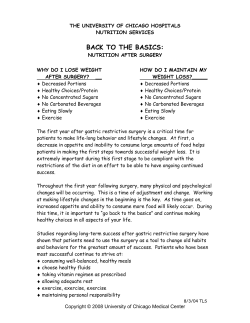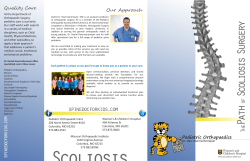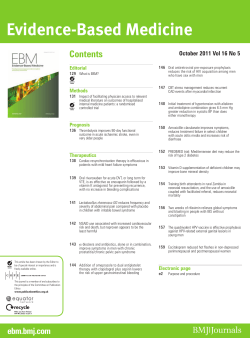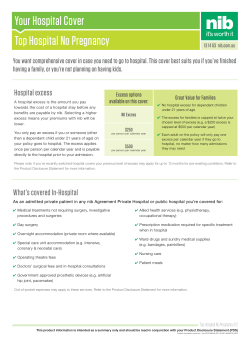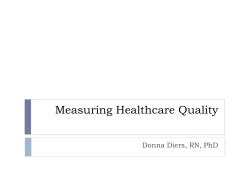
Document 178841
Evidence-Based Surgery
Chirurgie factueiie
Users' guide to the surgical literature:
how to perform a literature search
Daniel W. Birch, MD, MSc; Angela Eady, MLS; Don Robertson, MD; Sonja De Pauw, MESc;
Ved Tandan, MD, MSc; for the Evidence-Based Surgery Working Group
S
urgeons are instrumental in providing appropriate, cost-effective
health care.' This responsibilit\' implies that we must try to maintain a
standard of care that is consistent
witli tlie best available evidence. To
pursue an evidence-based approach
to surgical care, a surgeon must be
able to review relevant articles from
tlie literature in an efficient manner.
Therefore, the contemporary surgeon must have a simple mechanism
for carrying out a complete literature
search. Other publications in this
evidence-based surgeiy series have
described how to review various aiticles from the surgical literature. In
this paper, we provide tlie surgeon
with guidelines for searching tlie literature and a template for constnicting aji effective search strategy.
notices tliat you do not give heparin
prophylaxis for postoperative deep
vein thrombosis (DVT) in patients
undergoing colorectal surgery. Your
colleague suggests that a more aggressive approach to DVT prophylaxis is appropriate and encourages
you to change your practice. You are
concerned that heparin may increase
the risk of perioperative hemorrhage.
You wish to determine the most effective means of reducing the risk for
postoperative DVT but are uncertain
how to proceed. Therefore, you will
need to carry out a literature review,
which you hope to have completed
before your next major case in 2
days' time.
Clinical scenario
The essential component of an
effective search strategy is an appropriately designed question. The
question usually arises out of some
uncertainty in clinical care. The ques-
You are a busy surgeon in a highvolume surgery practice. During
your regular "OR day," a colleague
Deveioping a strategy
for a literature search
tion should be clear and focused —
describing a patient or clinical problem, the intei'vention or exposure,
relevant comparisons and the outcomes of interest. This is tlie PICO
method tbr producing well-designed
clinical questions {Table 1).-' It is
helpful to describe the clinical problem in your own words. This method
forms the basis for an effective search
strategN' by building an appropriately
worded question, a task tiiat is not as
simple as it seems and can be a timeconsuming exercise. However, an appropriately constructed question facilitates subsequent literature search.
Underscoring the key words in
die question now helps you to identify initial search terms. Use of these
terms will create a search strategy
based on text words. Text words are
those exact words found iii die smdy
title or abstract. Selecting general or
nonspecific terms will generate a
long list of studies, many of which
may be unrelated to your question.
Conversely, more specific search
From the Surgical Outcomes Researcti Centre, Department of Surgery, St Josepii 's Heaitt)care Hamiiton. and Department
of Surgery, McMaster University, i-iamiiton. Ont
Tiie Evidence-Based Surgery Woridng Group members indude: Stuatf Arohibaid. MD:'^^ MoNt Btiandari, !\/iD:^ Ctiaries H.
Goidsmitti. PhD;^^ Dennis Hong, MD:^ Jotin D. Miiier. MD;'^^ Mari<o Simunovic, MD. MPH;^*^^ Ved Tandan, MD, MSc;'^*^ Achili
Tiiama, tvJD;'^* John Urschei, MD:"^* Syivie Cornacchi,
'Department of Sutgery. St. Joseph's idospital. tDepartment at Surgery, MoMasfer Unlvetsity, tSurgioal Outcomes Research
Centre, McMaster University. §Department ot Clinicai Epidemiaiogy ond Biostatistics, McMaster University, and fHamiiton Health
Sciences, Hamiifon. Ont.
Accepted for pubiicafian Aug. 22, 2002.
Correspondence to: Dr. Ved Tandan. Director. Surgicai Outcomes Research Centre, St. Joseph's Heaifhcare Hamilton,
Department of Surgery, Rm. G815, 50 Charifon Ave. E. Hamiiton ON L8N 4A6, tax 905 621-6154: tandanv@mcmaster.ca
136
J can chir. Vol. 46. N" 2. avril 2003
© 2003 Canadian Medical Association
How to perform a literature search
terms will result in a more effective
and focused search strategy. We have
constructed a search strategy using
text words in Fig. 1.
Searching the literature
Once you have developed the clinical question,, the next step is to decide
which tool you should use to search
the literature. Most journal articles relevant to the pracdsing surgeon are indexed in the National Library of Medicine (NLM) MFDLINE database.
MEDLINE contains bibliograpliic citations from over 4000 biomedicai
journals published in the United States
and 70 other countries. It has more
than 10 million citations dating fi-om
1966 to the present. Other databases
are avaiiable that may be more appropriate for specialized searches of tlie
literature (e.g.,, EMBASE is a widely
used biomedicai and pharmaceutical
database),, but we will focus only on
MEDLINE in diis discussion.
Currently, MFDLINE may be
searched most effectively "online"
using a personal computer and standard Internet access. Online searching of MFDLINE through a search
engine is generally easier to use and
more current than print searching
(i.e., Index Medicus).^ In this article
we will focus on electronic or computer search strategies.
MEDLINF may be searched at
no cost using the NLM Internet
search engine PubMed (Fig. 2). This
search engine constructs and performs complex queries or searches of
a database of information (MFDLINE). Other online search engines
are available. A comparison of commonly used MEDLINF services is
available at www.medmatrix.org
/info/medlinetable.asp. Table 2
provides information about the free
"fbiu- star" search engines as rated by
Medical Matrix. We suggest the
reader start with PubMed, although
any of the listed search engines may
- Table 1
The PICO Method of Constructing a Question From o Ciinicai Scenario j
Description
step
Populafion
inteiventi on
Comparison
Outcome
!
For patients undergoing colorectal surgery ,,,
will DVT oroohvloxis with heparin ,,.
as compared witti no mettiod of DVT prophylaxis ,,,
produce fewer overaii compiications?
PICO = pollents, Intervaitlon, comparison, outcome of IrtteresI, DVT = deep vsin thfomDosIs,
be used. MFDLINF may also be
searched offline at any site providing
access to archived MFDLINF citations that may be stored in CD-ROM
format (e.g., university libraries).
One advantage of PubMed is tliat
it searches another database at the
same time: PRFMFDLINE. PRFMFDLINF allows you to search for
the author, title and abstract of journal articles before the records have
been indexed in MFDLINE. Certain
journals may not be indexed for over
a year after publication whereas
PREMFDLINE records arc updated
daily. The ability to access more recent articles through this database
may improve the accuracy and yield
of your search. If you want to be
sure to include P I U - : M F D L I N F in
your search then your strategy must
have text words.
Preappraised evidence-based
reviews
Resources are now available that
provide preappraised evidence-based
reviews of selected medical and surgical clinical problems. The literature
is reNiewed for studies that meet rigid
methodologic criteria. The body of
evidence is then analyzed, interpreted and summarized by experts in
the field. Fxamples of preappraised
information sources are the elec-
The Problem
Postoperotive DVT, Indications for heparin prophyiaslE. complications, clinical
evidence fcr reducing DVT wliti heparin
The Question <PICO)
For patients undergoing colorecta! surgery, will DVT prophylaxis wltti heparin
compared wltti no method of DVT propdyloxis produce fewer complications
overaii?
Key Words
Deep vein tfirombosis, prophylaxis, heparin
Search Results
initial PubMed search, no reslriclicns. 2184 arlicies
Reslricted to puplicotlons 1990 -2001, RCTs, Engiish lar^uoge: 232 articles
Restriction of RCIs reploced wlHi mefa-analysis; 29 articles
Restriction ot meto-analysis replaced wINi practice guideline; 3 articles
FIG. 1. Example algorithm for carrying out a literature search.
DVT = deep vein thrombosis; PICO = problem, intervention,
comparison, outcome; RCTs = Tondomized controlled trials.
FIG. 2. Home page of the PubMed search engine for searching
MEDLINE. Copyright of the National Center for Biotechnology
Information (NCBl), National Library of Medicine, Bethesdo, Md.
Can J Surg. Vol. 46, No. 2. April 2003
137
Birch et al
tronic version of ACP Journal Club
(available at www.acpjc.org) and die
Cochrane Library (containing systematic reviews and a register ot"
randomized controlled trials) at
www.cochranelibrary.coin (Fig. 3).
The Cochrane Library emphasizes
interventions, whereas the ACP
Journal Club includes suidies and reviews in the areas of etioiog}^, prognosis, therapy, diagnosis, quality improvement and economics. Some
authors are now suggesting that
these resources of preappraised reviews may ser\'e as tlic best place to
begin a search ofthe literature.^
The advantages of searching preappraised sources include more manageable search results containing highquality studies or reviews. Clearly, if
your clinical problem has been reviewed by a group of experts, aiid the
literauire has been appraised, you may
have all the information you need.
However, if your question has not
been re\icwed you will need to continue and complete a full MEDLINE
search. Presently, more medical topics
are addressed dian surgical, but tiiis
situation is improving.
If we choose to review the preappraised evidence at "Cochrane Reviews," we click on The Cochrane Library Web site, then "Abstracts of
Coehrane Reviews," and enter our
text words in the "Search for" window. This identifies a recent review
that proves extremely helpful (Eig.
4)." The Cochrane review not only
provides insight into the effectiveness
of DVT prophylaxis witli hepaiin but
also specifically addresses die scenario
of colorectal surgery. The reviewers
conclude that combining heparin and
mechanical methods (graded compression stockings) is the most effective means for reducing perioperative
DVT and pulmonary embolism. Although some of the statistical terms
may be unfamiliaj- to you, you tinderstand the power of tlie conclusions.
You remain concerned about the
potential for increased hemorrhagic
compiications with the use of heparin and you wish to review the
studies independently to clarify this
issue. However, the thoroughness of
this appraisal has done much to convince you to consider a change in
your practice.
Executing a MEDLINE search
We have presided a simple worksheet to guide you through the
process of developing and executing
Table 2
Characteristics of "Four Star" MEDLINE Search Engines
Search engine
^o fee
NLM Pub Med
Internet address
Features
www.ncbLnlm.nih.gov/PubMed
BioMedNet
Fee based
BioMedNet evaluoted MEDLINE
Knowledge Finder
Ovid On Coil
No registration required, PREMEDLINE, Boolean searches
saved searches. Clinical queries
Registration required, Includes other NLM databases
searches, natural language
http://research.bmn.com/medline
http://research, bmn, com/mediine
http://kfinder.com/newweb
http://preview,ovid,com
Free registration, Boolean searches
Free trial. Natural language, Boolean searches
Offline registration. Naturai language searches
.•:'.
^
,
• *
rKhinlcgl nwthoU Pv Ihrvni bopnHinvluli Incokirimiunivy (Cwnm
R
Wllli^arginitn p. Rurmii
BR. Bo;ly L
ii:_
;
*•
• • "
(OVT)
~
•'<•-
antrv (CTrm^ipnv
I.il-'
'•""""• " *
™!*,~";i:'i".",;b"'']V!:.
t i n ri TK« r-«^K
J »^
.
.
3- The Cochrane database of systematic reviews. Prepared and pubiished by Update Software, Oxford, UK.
138
J can chir. Vol. 46, N" 2, avril 2003
'^'®' ^- Abstract of an article on thromboprophylaxis in ooiorectai surgery obtained from the Cochrane Ubrary Prepared
and pubiished by Update Software, Oxford, UK.'
How to perform o literature search —i
a literature search (Fig. 5). A simple
method to search die literature is to
use PubMed by accessing the
PubMed home page www.ncbi.nlm
. n i h . g o v / P u b M e d . You can enter
your search terms in tlie search windt>w directly or by using the "Preview/Index" feature. The search
terms that you have selected from
your clinical question are "text
terms." PubMed will search for each
of these terms in the index fields
(title, abstract) unless otherwise specified. PubMed will automatically
combine these terms with the
Boolean operator* "and," which implies that all terms entered must be
found in each record retrieved
(which will restrict the focus of the
search, whereas the Boolean operator
"or" will expand the search).
Another method of searching is to
use medical subject headings (MeSH
terms). Ever\' article in the MEDLINE database is indexed according
to its content with specific MeSH
terms. As compared to a text word
search, MeSH terms may increase
the relevance of your search results.
However, most surgeons will be imfamiliar the appropriate MeSH terms
to apply to a search strategy. For certain topics, the consistency and accuracy of indexed MeSH terms may
not be satisfactory and therefore you
may not retrieve all relevant articles.
To gain familiarity with MeSH
terms, review specific terms associated with an abstract and conduct a
new search using these terms. A librarian will also be extremely helpflil
if you choose to improve your
knowledge of MeSH terminology', as
will the NCBI MeSH Browser
(www.ncbi.nlm.nih.gov/entrez
/meshbrowser.cgi).
Worksheet for Literature Searches
1,
Write a short, detailed description of the specific dinicoi probiem:
2,
Write the probiem as a question, inciuding the key issues (PICO):
Popuiation:
intervention:
Comparison: (optionai)
Outcome:
Underiine each of the i<ey words in your question.
These key words wiii become your initiai search terms:
/
J
.
Execute the initiai iiterature search (PubMed),
Consider carefuily initiai iimits or restrictions on your search:
Author(s)
Setting search limits
Pubiication date
Text word searching may result in
large numbers of irrelevant references because of the various wavs in
Publication type.
*A!tlK)iigh PubMed states thai tlic Btxjlcan operators must be capitalized, tliis is not necessary.
dates or by limiting the language of
the publication to English. Otlier criteria that are helpflil in eliminating
less relevant articles include human
or animal research articles, subsets of
journals (e.g., nursing journals, dental journals), gender and availability
of abstracts.
Choosing which limits to use viill
depend on your question. For tlierapy questions, limiting results by
publication type is hetpflil (i.e., clinical ti'ial, randomized controlled trial,
multicentre study, review, metaanatysis or practice guideline).
PubMed only allows you to apply
one publication t\'pe at a time on the
Limit page. To apply more tlian one
publication type, you may use the
Preview/Index page.
which a paiticular word may be used
in an abstract or title. If you are
searching for a topic tliat is described
in different ways, you may need to
use synonyms for the disease or inter\'ention. In these cases you would
combine the terms \Wth the Boolean
operator "or." Therefore, each
record will include at least one of the
synonyms chosen.
If your search leads to an unmanageable number of referenees, you
should try to restrict or limit the
search. This is a way of refining the
search and increasing the relevance
of each of the retrieved articles. For
example, you may limit your search
by specifying a certain publication
type (i.e., randomized controlled trials), a specific inter\-'al of publicadon
Language
7,
Execute a second search and review the references you have found.
Consider further restrictions on your search or choose new search terms
based on your review of the references obtained.
FIG. 5. A sample worksheet for literature searches.
Can J Surg, Vol. 46, No. 2, April 2003
139
Birch et al
On the Preview/Index page you
can select publication type in the
drop-down box and t>'pe: clinical
trial "or" randomized controlled triai
"or" multiccnter study "or" metaanalysis. This page is also useful to
enter search terms for any field (all
fields or limit to title, author, and so
on) and have PubMed add the
search criteria automatically to your
search window (Fig. 6).
Limiting die search by publication
type is not as helpRil with questions
about etiology, diagnosis or prognosis. Search limits for age and gender
will depend on the question. Limiting by language runs tlie risk of excluding an important piece of evidence. However, practical constraints
may make it difficult to obtain or
translate an article in another language. Keep in mind that MEDLINE usually provides an abstract in
English for many studies published
in other languages.
Clinical query filters
PubMed also provides clinical
query filters, which use methodologic
terms to limit search results to the ar-
eas of therapy, diagnosis., etiology,
and prognosis. Click on "Clinical
queries" at the PubMed home page
to access these filters. You can choose
to emphasize sensitivity (greater
catch) or specificity (smaller cateh)
when selecting whieh filter to use.
These filters are based on the work of
Haynes and associates.^ Further study
is underway to update these filters.
Sample search
In our example algorithm (Fig. 1)
we have stated our clinical question as
clearly as possible. After selecting key
words to act as our initial search tenns,
we consider how we may choose to
limit OLir search. For illustration, we
ran a search witli na limits on our key
text words "deep vein thrombosis,"
"prophylaxis" and "heparin." This
generated a list of 2184 aiticles. If we
limit our search to only those articles
describijig randomized conti-olled trials published in English since 1990,
we will reduce our list to 232 studies.
It is reasonable at diis point to re\iew
the titles and abstracts for stjine of die
articles we have found by clicking on
the title as displayed. This links us to
Nltloiul I
Ubmry
I
BodtB operuati AIJD, 0R.NOTiniin t t muppncuc
If irarth Etldi ogmrt usfd sncloK m sqiwr buckci!. s g .
r-sT-b ITII:-^ nuy csubdc Dl piotcis b d publifihET fuppbed C
r
C4ilv tans With nbsi
Uir Ihf fcnrnil VYYYfMMmD, hOnlh n d il^^ «< optuliul
FiG. 6. Setting search limits in ttie PubMed searcti engine.
Copyhgtit of ttie Nationai Center for Biotectinotogy information (NCBi), Nattonai Library of Medicine, Bettiesda, Md.
140
J can chir, Vol. 46, N" 2. avril 2003
the online written abstract. Scanning
throLigli several articles may help us to
understand how to limit our search
further witliout jeopardizingfinalcontent. After reviewing some of the abstracts we realize there is a wealth of
knowledge and studies addressing the
issue of DVT prophylaxis in all surgical
specialties. Therefore, we choose to
"raise the bar" on the publication
type. We change the publication ty-pe
fi-om randomized controlled trial to
meta-analysis and retrieve 29 articles.
We review these abstracts and find
tiiat the majorit)' ot" references relate
to ortliopedic patients. However, a
recent meta-anaiysis compares die use
of various forms of heparin as DVT
prophylaxis in general surgery (low
molecular weight heparin v. Luifi-aetionated heparin and v. placebo).* We
review the abstract to find an impressive reduction in the risk for DVT
following either form of prophylaxis.
There may also be a slight increase in
the risk of hemorrhagic complications; however, specific details are not
provided in the abstract. We can
record the reference to obtain the
article for further review by either
saving the abstract on our personal
computer or printing the abstract
directlyfi-omthe browser window.
If we then change the publication
type to practice guidelines, we retrieve
3 articles. One of these references is
the guidelines from the American
Society of Colorectai Surgeons.^ Tliis
reference is also recorded for review as
little detail is given or recommendations provided in the abstract.
Summary
The Maintenance of Competence
initiative (MOCOMP 2000) by the
Royal College of Physicians and Surgeons of Canada provides a template
for lifelong learning for all physicians
and surgeons. The objectives include
"... ensuring tiiat fellows are engaged
in professional development endeavours tliat are directed at enhancing
the quality of specialty care."'" The
American College of Surgeons lists a
How lo perform a literature search
commitment to lifelong learning as 1
of the 4 required elements for maintenance of certification." Professional
development includes the ability to
conduct a literature search to answer
a clinical question or problem.
Having access to a personal computer and the Internet allows a surgeon to complete a literature search
at the office or home. It is not difficult to perform a literature search,
tlie challenge is to recognize when it
is necessary and to find the time to
complete it. It is no longer acceptable for a surgeon to be estranged
from the current literature — the demands of colleagues, licensing bodies
and patients necessitate satisfactory
knowledge of die best avaiiabie evidence for surgical care.
Now with your literature search
complete and relevant articles reviewed, you make a decision to change
your practice and provide heparin prophylaxis to prevent DVT in patients
undergoing colorectal surgery. You
Medical As.sociati()n Press; 2002. p. 27-38.
6, Wille-jDrgensen P, Rasmusscn MS, Andersen BR, Burly L. Heparins and mechanical mediods for thromboprophyla.\is
in colorectal surgery (Cochrane Review).
In: The Cochrane Library, Oxford: Update
Software; 2002. issue 2.
References
7. Haynes RB, Wilczynski N, McKibbon KA,
Walker CJ, Sinclair JC. Developing opti1. Guyatt GH, Meadc MO, Jacschke RZ,
mal search strategies for detecting cliniCook DJ, Hayncs RB. Practitioners of evically sound studies in MEDLINE. / Am
dence based care. Not all clinicians need
Med Inform Assoc 1994;l:447-58.
to appraise evidence from scrarcli but all
8. Mismetti P, L<iporte S, Darmon JY, Buchneed some skills. BMJ 2000;320:954-5.
muller A, Decousus H. Meta-analysis of
2. McKibboii A, Eady A, iMarks S. PDQ
low molecular weight hepatin in die preEvidence-based principles and practice.
vention of venous thromboembolism in
Hamilton (ON): B.C, Decker; 1999.
general surgery. 5 r / 5 « r ^ 2001;88:913-30.
3. Sackett t)L, Straus SE, Richardson WS,
9, The Standards Task Forec of die AmeHcan
Rosenberg W, Hayncs RB, editors.
Society of Colon and Rectal Surgeons,
Evidence-based medicine: how to practice
Practice parameters for the prevention of
and teach EBM. 2nd ed. Philadelphia:
venous thromboembolism. Dis Colon /teeChurchill Livingstone; 2000,
r«»j2000;43:1037-47.
4. Hunt DL, Jaeschke R, McKibbon, Users'
10. The Royal College of Physicians and Surguides to the medical literanire: XXi, Usgeons of Canada: Maintenance of Certifiing eiecti'onic health information resources
cation. Available http://rcpsc,mcdical.org
in evidence-tiased practice. Evidence/english/maintenance/programiiifb/inBased Medicine Working Group. fAMA
dex.php3 (accessed 2003 Eeb 5).
2000;283:1875-9.
11. Nahnvold DL. The competence move5. Guyatt G, Rennie D, editors. Users'guides to
ment: a report on the activities of the
the medical literature: a manual for evidenceAmerican Board of Medical Specialties.
based clinical practice. Evidence-Based MediBull Am Coll Surg 2000;85( 11): 14-8.
cine Working Group. Chicago: American
make a fijrther decision to explore
fijtiire questions in clinical care with a
literature review to decide upon possible changes in practice.
Calendar
Calendrier
Update in general surgery
Update in General Surger\'^ 2003, tlic
43rd annual course for practising
surgeons, sponsored by the Faculty
of Medicine, University of Toronto,
will be held from Apr. 24-26, 2003
at the Westin Harbour Castle,
Toronto. Credits: Royal College of
Physicians and Surgeons of Canada,
AMA Category 1. For registration
information contact Continuing Fducation, Faculty of Medicine, Uni-
versity of Toronto, 500 University
Ave., Ste. 650, Toronto ON M5G
1V7; tel 416 978-2719; fax 416
971-2200; ce.med@utoronto.ca;
www.cme.utoronto.ca
Advances in breast cancer
Continuing Education, Faculty of
Medicine, University of Toronto is
sponsoring a course entitled "Advances in Breast Cancer: From Molecular Pathology and Imaging to
Therapeutics." The course will be
held at the Sutton Place Hotel,
Toronto, on June 20 and 21, 2003.
Credits: Royal College of Physicians
and Surgeons of Canada, AMA Category 1. For registration and call for
papers information contact Continuing Education, Faculty' of Medicine,
University of Toronto, 500 University Ave., Ste. 650, Toronto ON
M5G 1V7; tel 416 978-2719; fax
416 971-2200; ce.med@Litoronto.ca;
www.cme.utoronto.ea
Can J Surg, Vol. 46. No, 2, April 2003
141
© Copyright 2025

